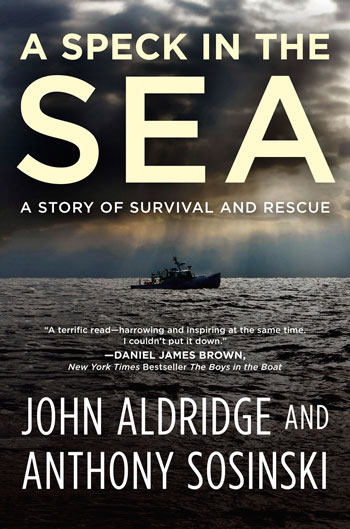B O O K R E V I E W
Against All Odds

A Speck in the Sea
Hachette Books Group, 2017
$27, 262 pages
At 3 a.m. in July of 2013, John Aldridge fell off his lobster boat miles from shore. He watched the boat steam off on autopilot. Statistically he was a dead man. His fishing partner, who had been asleep below, would awake hours later to discover Aldridge not aboard.
His fishing partner immediately called the Coast Guard, triggering all its assets. Notification of their homeport of Sag Harbor brought out dozens of boats that worked with the Coast Guard. All this could not convince the CG to be any more confident that this search would be any more successful than most man-overboard situations like this in bringing back Aldridge alive.
Finding Aldridge was likened to finding something the size of a coconut, his head above water, in an area of ocean the size of Rhode Island. Aldridge would beat the odds as a result of several things, not least of which were his resourcefulness and recognizing the importance his fisherman’s knowledge.
These kept him above the surface for the 12 hours it took the best-trained crews operating the best technology and equipment and the support of dozens of civilians to find him.
The book is a page-turner. Anyone who works on the ocean knows someone or of someone who has gone over. Anyone who lives near the ocean knows people go overboard. A Speck In The Ocean describes what it is like. One significant difference is that this story is told by the survivor of a long time in a large piece of ocean.
Aldridge quickly moves out of panic mode and settles into immediate problem-solving mode.
He discovered that his water-logged heavy boots, well-known for sending people to the bottom, becomes flotation when removed and upside down. The disaster of being overboard becomes a 12-hour workday keeping afloat and remaining slightly visible.
What he has to say about what he did to stay alive would be valuable to other fishermen. His thinking and composure in a life-threatening reality is a lesson as well. Aldridge also mentions things he might have done differently that might have improved his odds of being found sooner, and conceivably prevented the incident in the first place. The Coast Guard said that if Aldridge had had a personal flotation device and an emergency position indication radio beacon, he would have been found nine hours earlier.
